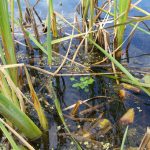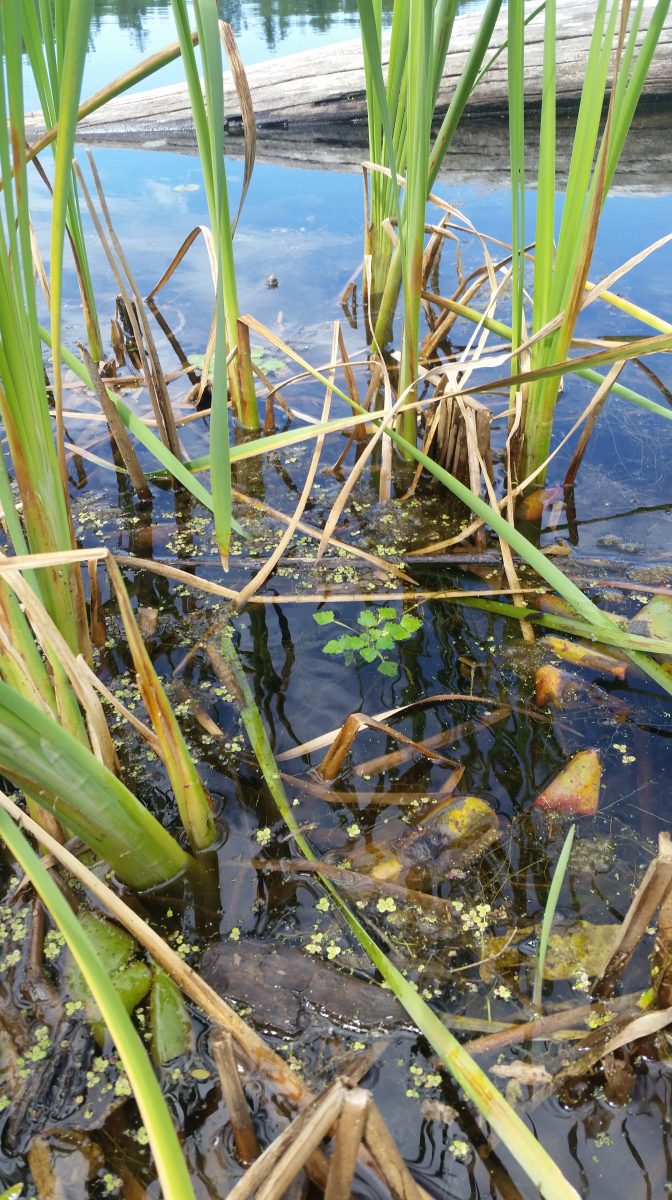
Barely perceptible among tall leaves here, the water chestnut can wreak havoc on water ecosystems (FILE PHOTO)
WESTFIELD — The Conservation Commission heard from Aliki Fournier of the Connecticut River Conservancy about the planned removal of invasive water chestnut plants from the Brickyard Ponds by volunteers, during a discussion that continued from July 28.
Fournier, an ecology planner with the non-profit based in Greenfield, said she was there to apply for the “continuing efforts of water chestnut removal at the Brickyard Ponds east and west of Root Road.” Fournier said the conservancy had initially taken over the effort from the U.S. Fish and Wildlife Service to remove water chestnuts from the Connecticut River watershed in Connecticut, Massachusetts, New Hampshire and Vermont.
Fournier said the work in the ponds at Root Road, North Road and Summit Lock Road has been going on for several years.
“We’ve been able to control the growth of the water chestnut in that water body, and we would like to continue that effort for the next several years,” she said.
Fournier said the water chestnut plant was first introduced as a decorative plant in Cambridge, Mass., and is now found in waterways from Georgia to Canada. She said seeds can survive for 12 years, and it’s important to keep going out and pulling all of the plants.
Commissioner Thomas Sharp, a former volunteer on the project, asked whether the conservancy had insurance on volunteers for projects like the invasive plant removal.
Fournier said they were contacted by the two landowners who were concerned about liability for the activity on their land.
“We were able to add them onto our insurance coverage for liability and property damage,” she said, adding that once that is done, every participant will be asked to sign a waiver. She said she did get the consent of the two landowners on whose property they will be working, to add them to the process.
Abutter John Keilch, who spoke against proceeding with the project at the last commission meeting, did not participate in the discussion on Aug. 10. The ponds currently being cleared are not on his property. His concern was that the activity would promote fishing, boating and kayaking on privately owned waterways.
The project was approved with the condition that the landowners be informed when the work will occur, that the plant material be removed off site, and vehicles onsite be kept to a minimum.
The commission also extended approval to the Department of Public Works for its vegetation management plan throughout the city. Parks and Recreation Deputy Superintendent Scott Hathaway said the work will be focused on hand-removing knotweed around Well 1 between Paper Mill and Springdale, and on removing invasive plants at Whitney Park on the Westfield River and restoring it to a natural state.
Hathaway said the Whitney Park area was infested with knotweed, buckthorn and other invasives. “I want to make a parklike atmosphere,” he said.
Approval was granted with the conditions that the Conservation Coordinator Meredith Borenstein be kept informed of the program and location of the work being done, that any needed permits be filed with the Massachusetts Department of Environmental Protection, and that herbicide be used on the knotweed only after it flowers and at night to reduce impact on pollinators.


